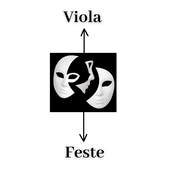Sentry Page Protection
LOVE.
The three characters that form the love triangle exemplify the theme of love. Duke Orsino loves Olivia, Olivia loves Cesario (Viola), and Cesario (Viola) loves
The three characters that form the love triangle exemplify the theme of love. Duke Orsino loves Olivia, Olivia loves Cesario (Viola), and Cesario (Viola) loves
|
Duke Orsino. Whether or not these characters are 'in love' by twenty-first-century standards or not, is a concept that is debatable. The focus should remain on the fact that these characters have chosen to pursue, or pine after, a connection with each other. Duke Orsino ardently pursues Olivia, despite being constantly rebuffed. He even goes to the extent of having Cesario (Viola) woo her in his place since she would not see him. Olivia also ardently pursues a love connection with Cesario (Viola). She decided, right away, that he was the one for her and went as far as (www.bulbsoup.com) to send Malvolio to return a ring that Cesario did not leave behind. This was the bait to have him visit her so that she could secure a romantic bond with him. Finally, there is Cesario (Viola). This is the only character that simply pines after her love interest. She, in the guise of the eunuch Cesario, does not actively pursue a love connection, she simply speaks to him, as servant to master. She very subtly tried to tell him that she was a female, at one point in the play, but Orsino does not pick up on the subtle hint.
|
Irony is a technique that highlights the theme of love. This is the case because it is ironic that Cesario (Viola) is given the task of wooing Olivia for Duke Orsino and ends up falling in love with the Duke herself. This irony continues when Olivia ends up falling in love with Cesario (Viola), instead of the Duke, as intended. Both these outcomes are unexpected because one would think that (www.bulbsoup.com) Olivia and the Duke are suited for each other, based on the similarities of their social and economic status, but the attraction lies elsewhere for Olivia and Cesario (Viola) seeks to go outside of her outward social and economic status with her interest in the duke. Both characters, Olivia and Viola (Cesario) go outside of the bounds of the social and economic protocols of the day, with their interest in their 'love interests'.
DECEPTION.
This theme is seen at the opening of the play when Viola decides to don the disguise of a eunuch. She makes a deliberate decision to lie about her true identity to every character that she encounters, after her discussion with the sea captain 'Conceal me what I am, and be my aid for such disguise as haply shall become the form of my intent." (Act 1, scene 2, lines 53-55). Deception is also highlighted through the character Maria, who uses deception to trick Malvolio into believing that Olivia is interested in him in order to spite him. Her (www.bulbsoup.com) ally in this successful venture was Sir Toby Belch and Feste, who allowed Maria to transform him into Sir Topas, to further torture Malvolio. Finally, the theme of deception is highlighted through the actions of Olivia, who sent Malvolio to deliver a ring to Cesario, a ring that he did not leave behind. This deceptive move was made to ensure that he would visit her again. These characters; Viola, Maria, Sir Toby Belch, Feste, and Olivia all exemplify the theme of deception.
Dramatic irony is a technique that highlights the theme of deception. This is the case because the audience is aware that Viola is disguised as Cesario, but none of the characters know this. The result is that all the characters behave inappropriately towards Viola (Cesario), with the main focus being the result of Olivia's ignorance. We see Olivia pledging her undying (www.bulbsoup.com) love to another female, who she believes to be a male. The deception that Malvolio faces is also highlighted by dramatic irony. We, the audience, are aware of the plot against Malvolio, but he is not. The result is that he acts according to the letter and literally appears to be a madman.
This theme is seen at the opening of the play when Viola decides to don the disguise of a eunuch. She makes a deliberate decision to lie about her true identity to every character that she encounters, after her discussion with the sea captain 'Conceal me what I am, and be my aid for such disguise as haply shall become the form of my intent." (Act 1, scene 2, lines 53-55). Deception is also highlighted through the character Maria, who uses deception to trick Malvolio into believing that Olivia is interested in him in order to spite him. Her (www.bulbsoup.com) ally in this successful venture was Sir Toby Belch and Feste, who allowed Maria to transform him into Sir Topas, to further torture Malvolio. Finally, the theme of deception is highlighted through the actions of Olivia, who sent Malvolio to deliver a ring to Cesario, a ring that he did not leave behind. This deceptive move was made to ensure that he would visit her again. These characters; Viola, Maria, Sir Toby Belch, Feste, and Olivia all exemplify the theme of deception.
Dramatic irony is a technique that highlights the theme of deception. This is the case because the audience is aware that Viola is disguised as Cesario, but none of the characters know this. The result is that all the characters behave inappropriately towards Viola (Cesario), with the main focus being the result of Olivia's ignorance. We see Olivia pledging her undying (www.bulbsoup.com) love to another female, who she believes to be a male. The deception that Malvolio faces is also highlighted by dramatic irony. We, the audience, are aware of the plot against Malvolio, but he is not. The result is that he acts according to the letter and literally appears to be a madman.
DISGUISE.
Disguise literally means to give someone or oneself a different appearance in order to conceal one's identity. There are two characters that utilize disguise in the play; Viola and Sir Topas. Viola disguises herself as the eunuch Cesario, in order to have the ability to move about freely. This disguise gave her the advantage of
Disguise literally means to give someone or oneself a different appearance in order to conceal one's identity. There are two characters that utilize disguise in the play; Viola and Sir Topas. Viola disguises herself as the eunuch Cesario, in order to have the ability to move about freely. This disguise gave her the advantage of
|
assuming a male persona, which would grant her freedom of movement while being a eunuch would excuse her feminine traits. The fact that she was correct in this assumption is seen through the fact that Duke Orsino used these very traits, a 'feminine male', to pursue Olivia 'Diana's lip is not more smooth and rubious; thy small pipe is as the maiden's organ, shrill and sound, and all is semblative a woman's part.' (Act 1, scene 4, lines 31-33). He asked his non-threatening eunuch to achieve what he could not do, due to Olivia's stubborn rejection of his suit. Therefore, while Viola's disguise exists for survival purposes, Feste's disguise is for pure mischief. When he visits Malvolio in his cell, he tricks him by telling him it is light when it is actually dark and discusses Malvolio's (www.bulbsoup.com)madness with his true self, Feste, thereby tormenting Malvolio. It is, therefore, clear that Disguise is an important theme in the play, its purpose being to advance the plot.
|
Dramatic Irony highlights the theme of disguise. This is the case because the audience knows that Viola has assumed the role of Cesario, as well as the fact that Feste has donned the disguise of Sir Topas. The issue lies in the fact that no other character, with the exception of the sea captain, knows that Caesario is a disguise, and (www.bulbsoup.com) Malvolio certainly is unaware that Feste is Sir Topas. As a result, individuals suffer adverse effects of their ignorance, based on the fact that they act inappropriately. Dramatic irony, based on, in essence, the element of disguise, adds to the conflict in the play. Viola's disguise leads to cases of mistaken identity that heighten the tension in the play.

APPEARANCE VERSUS REALITY.
The theme of appearance versus reality addresses the concept of something or someone looking like they are one way, but that is not the true picture. Essentially, what you are seeing is not real, not true. This theme is evident in the cases of mistaken identity that are found in the play:
Dramatic irony highlights the theme of disguise. This is the case because the audience knows several things that the characters do not.
The theme of appearance versus reality addresses the concept of something or someone looking like they are one way, but that is not the true picture. Essentially, what you are seeing is not real, not true. This theme is evident in the cases of mistaken identity that are found in the play:
- Antonio thinks that Cesario is Sebastian when he is apprehended by the police, and he asks who he believes to be Sebastian for the purse that he gave him earlier in the day.
- Olivia addresses who she thinks is her husband, Sebastian, but is, in fact, his twin, Olivia, disguised as Cesario.
- Sir Andrew accosts who he believes to be his attacker, Cesario, but his attacker is in fact, Sebastian, the second half of a twin who looks even more like his sister because she is disguised as a male.
Dramatic irony highlights the theme of disguise. This is the case because the audience knows several things that the characters do not.
- We know that Antonio was trying to get his purse from Cesario (Viola), not Sebastian
- Sebastian is alive
- Olivia has married Sebastian, not Cesario
- Sir Andrew was beaten up by Sebastian

SELF-DECEPTION.
This theme is portrayed through two characters in particular, Olivia and Malvolio. Malvolio willfully deceives himself when he literally attempts to fit his name into the contents of the letter that he found ' ' (Act, scene). It was a stretch, but he so desired to be wanted by Olivia, that he rationalized (www.bulbsoup.com) and negotiated for it to be the reality. The case is the same for Olivia. She decided that she was going to pursue Cesario, despite the fact that she recognized that he (she) did not have an interest in her. It is in the recognition, then the dismissal of the fact, wherein lies the self-deception. He doesn't like me? Let's make it happen. Olivia believed that he would eventually see value in her, so his 'current' lack of attraction was irrelevant to her. This act of self-deception reveals that Olivia is prideful. She has so much confidence in her ability to catch Cesario's attention that she does not look closely enough to see what the audience already knows, Cesario is a female. Malvolio's self-deception highlights the fact that he is ambitious. He wants to reach beyond his current station in life and is literally grabbing at this opportunity that has been laid before him.
Dramatic Irony highlights the theme of self-deception. This is the case because in both scenarios, Olivia and Malvolio's, the audience is aware that both situations are impossibly stacked against these characters. Olivia cannot get her dream of being with Cesario because he does not exist. Cesario is, in fact, a lady called Viola. So the man that she is in love with is an insubstantial disguise. The same is the case for Malvolio. The letter on which his desires stand was not written by (www.bulbsoup.com) Olivia but by Maria. This means that there is no hope for his dream of being with Olivia. Both scenarios highlight the theme of self-deception because the characters are in hopeless situations and they are totally unaware of it. They have deluded themselves, based on false information presented to them, with no positive outcomes on the horizon.
This theme is portrayed through two characters in particular, Olivia and Malvolio. Malvolio willfully deceives himself when he literally attempts to fit his name into the contents of the letter that he found ' ' (Act, scene). It was a stretch, but he so desired to be wanted by Olivia, that he rationalized (www.bulbsoup.com) and negotiated for it to be the reality. The case is the same for Olivia. She decided that she was going to pursue Cesario, despite the fact that she recognized that he (she) did not have an interest in her. It is in the recognition, then the dismissal of the fact, wherein lies the self-deception. He doesn't like me? Let's make it happen. Olivia believed that he would eventually see value in her, so his 'current' lack of attraction was irrelevant to her. This act of self-deception reveals that Olivia is prideful. She has so much confidence in her ability to catch Cesario's attention that she does not look closely enough to see what the audience already knows, Cesario is a female. Malvolio's self-deception highlights the fact that he is ambitious. He wants to reach beyond his current station in life and is literally grabbing at this opportunity that has been laid before him.
Dramatic Irony highlights the theme of self-deception. This is the case because in both scenarios, Olivia and Malvolio's, the audience is aware that both situations are impossibly stacked against these characters. Olivia cannot get her dream of being with Cesario because he does not exist. Cesario is, in fact, a lady called Viola. So the man that she is in love with is an insubstantial disguise. The same is the case for Malvolio. The letter on which his desires stand was not written by (www.bulbsoup.com) Olivia but by Maria. This means that there is no hope for his dream of being with Olivia. Both scenarios highlight the theme of self-deception because the characters are in hopeless situations and they are totally unaware of it. They have deluded themselves, based on false information presented to them, with no positive outcomes on the horizon.
Contributor: Leisa Samuels-Thomas








